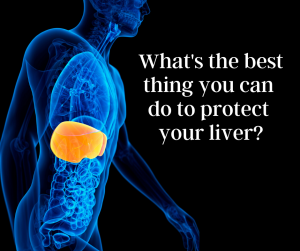
You might think that a sluggish liver is something that only heavy drinkers or fans of fried food have to worry about. However, conditions like fatty livers are becoming increasingly common among people who don’t drink much alcohol at all. In fact, a fatty liver affects up to 25 to 30 percent of us. And its effects can be far-reaching.
Hepatic Steatosis
Let’s start with an important distinction. It is true that alcoholics are more prone to fatty livers, or hepatic steatosis. When a problem drinker has too much fat in their liver, it’s also called alcoholic fatty liver disease. Perhaps not surprisingly, in non-alcoholics this condition is called non-alcoholic fatty liver disease.
What exactly is a fatty liver?
A simple explanation is that it happens when fat accumulates in the liver. Your liver is an organ that metabolises the fat in your diet, and it's normal to have some fat in and around it. But excessive amounts can lead to inflammation. That can lead to scarring, and if left unchecked, cirrhosis, which carries many health risks. The end result can be eventual liver failure, which can be fatal. In fact, it’s the 12th most common cause of death in the U.S.
Of course, for most of us, the consequences of a fatty liver aren’t as severe. However, a fatty liver can take a big toll on your overall well being and energy levels.
Symptoms of a Fatty Liver
Dull Ache Behind the Ribs
Have you ever felt a nagging pain in the upper right quadrant of your abdomen, the area just behind your lower rib cage? That can be a sign of liver problems. The pain is often felt as a dull ache, but can progress to include nausea or vomiting.
Chronic Fatigue
Here’s another question: Do you ever feel chronically tired? If you feel as if you can’t catch up on getting enough rest, or that you just don’t have the energy that you used to, you might want to investigate your liver function. After all, your liver is responsible for processing the nutrients from the food that you eat. When it’s not functioning properly, you could miss out on valuable sources of energy.
Because these symptoms can be easily dismissed, it’s important to see a qualified practitioner if you suspect a sluggish liver, as proper testing such as a blood test and sometimes ultrasound are necessary to diagnose the condition or to put your mind at ease.
Causes of Fatty Livers
Alcoholism
The “classic” cause of liver problems is excessive drinking. However, more people who are experiencing fatty liver symptoms aren’t heavy drinkers at all.
Obesity
So, what’s to blame? Obesity. That’s largely because obesity creates the kind of inflammation that leads to your liver storing fat. The connection between a fatty liver and obesity isn’t a simple matter of how much you weigh. It’s also connected to where that body fat is stored. Fat that accumulates around your belly is more likely to signal liver issues.
High Sugar Diet
A diet high in sugar and simple carbohydrates can trigger liver issues as well. Although you may have thought that a high-fat diet would be the prime culprit, simple carbs are equally at risk for creating a fatty liver. That’s because a high-carb diet can lead to inflammation as well as creating conditions in your gut microbiota that promote fat absorption in the liver. In particular, drinking too many sweet drinks is a major cause of liver fat accumulation.
Treating a Fatty Liver
Weight Loss
Studies have found that the most effective way to treat fatty livers is to lose weight. Even a small amount of weight loss can help reduce inflammation, improve fat metabolism and improve liver function.
Healthy Nutrition
A whole-foods, low-carb approach to dropping extra pounds is often effective. Strategies that have been found to help liver health include:
● Consuming lots of fibre to improve elimination
● Drinking antioxidant green tea
● Choosing healthy monounsaturated fats, which are found in foods such as avocados, olive oil, and nuts
● Adding plenty of nutritious and anti-inflammatory green vegetables such as broccoli
● Choosing fish high in omega 3 fatty acids, such as salmon and sardines
At the same time, you should limit:
● Alcohol
● Sugar
● Red meat
● Refined white carbs such as white bread and white rice
Exercise
In addition, exercise can help lower the levels of fat in your liver. Interestingly, the benefits of exercise happen even if weight loss isn’t the end result.
Low-intensity cardio, high-intensity interval training, and strength training have all been proven to be effective. The most important thing is to be consistent with the activities you enjoy.
Supplements to Support Liver Metabolism
Several supplements show promise in treating fatty livers, including milk thistle and berberine. Discuss these with your Naturopathic doctor to make sure that they are right for you.
Your liver is amazingly resilient, in fact it is the only visceral organ in your body that is able to regenerate. A full liver can regenerate from as little as 25% of the original liver! Taking action to protect the health of your liver will help to protect your energy levels and prevent more serious health problems down the road.
If you have been diagnosed with Fatty Liver Disease or if would like to go over the lifestyle changes that can help prevent liver damage, please give us a call. We can help.
References:
https://www.ncbi.nlm.nih.gov/pubmed/23273500"
https://www.wjgnet.com/1007-9327/full/v23/i36/6571.htm
https://www.ncbi.nlm.nih.gov/pmc/articles/PMC6163009/
https://www.ncbi.nlm.nih.gov/pubmed/27581063
https://www.ncbi.nlm.nih.gov/pubmed/18317656
https://www.sciencedaily.com/releases/2012/04/120422162417.htm
https://www.ncbi.nlm.nih.gov/pubmed/26865652
https://www.ncbi.nlm.nih.gov/pubmed/24764677
https://www.ncbi.nlm.nih.gov/pubmed/22213436
https://translational-medicine.biomedcentral.com/articles/10.1186/s12967-015-0383-6


